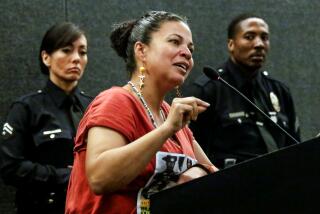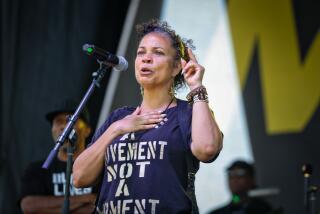Testing the Limits : The fatal shooting of a Texas trooper during a routine traffic stop sets up a conflict over the words in a rap song that may wind up . . . : Testing the Limits
EDNA, Tex. — It’s hard to imagine a case with two antagonists more estranged than Linda Sue Davidson and Tupac Amaru Shakur.
Davidson, a white middle-aged state trooper’s wife, has spent the past 20 years raising her two children in this tiny Texas town where country music rules the airwaves and John Wayne’s portrait hangs on the wall of the local cafe.
Shakur--a nationally known black rapper and actor who will star opposite Janet Jackson in director John Singleton’s upcoming film “Poetic Justice”--grew up on the mean streets of New York, Baltimore and Oakland, reared by a family of militant Black Panthers.
Yet on the night of April 11, their lives became entwined in tragedy.
Davidson blames Shakur’s music for the death of her husband, Bill, a Texas state trooper, who was gunned down during a routine traffic stop on a highway near here. The officer was shot by Ronald Ray Howard, a 19-year-old eighth grade dropout who said he was listening at the time to a tape of Shakur’s violence-laced “2PACALYPSE NOW” album.
Police recovered a homemade copy of the album--which has sold an estimated 400,000 units since its release last fall by Interscope Records and Time Warner--from the tape deck of Howard’s stolen vehicle after the shooting.
“There isn’t a doubt in my mind that my husband would still be alive if Tupac hadn’t written these violent, anti-police songs and the companies involved hadn’t published and put them out on the street,” said Davidson, tugging at her husband’s wedding band, which dangled from a gold chain around her neck.
“I’m sure Tupac has no feeling for me or what happened to my husband. He obviously has a great anger toward law enforcement. All he cares about is singing his songs and making his money, no matter who he hurts.”
Shakur is being silent.
Representatives for him and his record label, Los Angeles-based Interscope Records, deny Davidson’s allegations. The 21-year-old Oakland rapper turned down dozens of requests to be interviewed in connection with this article.
The entertainer, however, may soon have to speak in court.
There is a strong likelihood that Shakur will be subpoenaed to testify at Howard’s upcoming criminal trial, scheduled to convene in Austin, Tex., on March 15, sources said. Howard’s attorneys are expected to cite the music’s influence as a mitigating factor in the crime during the penalty phase of the trial.
In addition, the rapper is the target of a multimillion-dollar product liability suit filed by the widow accusing him and the companies that market his album with gross negligence in manufacturing and distributing music that incites “imminent lawless action.”
“I believe this kind of music can have a definite influence on people’s behavior,” said the 43-year-old widow in her first interview since her husband’s death. “Ron Howard may have pulled the trigger, but I think Tupac, Interscope and Time Warner share in the guilt for Bill’s death and they ought to take responsibility for their actions.”
The lawsuit is not Shakur’s first brush with the legal system.
Like the characters he raps about and portrays on film, the Bronx native is no stranger to violence or scuffles with police.
His mother, Shakur’s press biography says, was a member of the militant Black Panther Party at the time of his birth and his father was shot to death shortly after his release from prison, though the circumstances aren’t explained.
Tupac’s godfather is former Black Panther leader Elmer “Geronimo” Pratt, who was convicted of murdering a Santa Monica woman in 1972 and is currently serving a life sentence at Tehachapi State Prison.
Two months before Davidson filed her suit against the rapper, a dispute at an outdoor festival in Marin City, Calif., involving Shakur and his entourage erupted in gunfire, causing the accidental killing of a 6-year-old boy who was riding his bike nearby. The case is still under investigation by the Marin County district attorney.
Shakur first gained recognition as an entertainer two years ago when he joined San Francisco’s Grammy-nominated rap group Digital Underground, toured nationally with them and appeared on their 500,000-selling album “Sons of the P.”
He went solo last October with the release of “2PACALYPSE NOW,” a series of grim inner-city tales about police brutality, gang warfare, drug dealing, incest, sexual abuse and teen pregnancy. The album also contains the following inscription on its CD jacket: “F--- all Police, Skinheads, Nazi whatever!!”
Here’s a sample lyric from “Soulja’s Story,” one of several violent racks on the album:
Cops on my tail, so I bail till I dodge them,
They finally pull me over and I laugh,
Remember Rodney King
And I blast his punk ass
Now I got a murder case ...
... What the f --- would you do?
Drop them or let them drop you?
I choose droppin’ the cop!
“Tupac is respected in the rap community,” said James Bernard, senior editor of the Source, the nation’s leading rap music journal. “He’s considered to be a serious rapper who writes about social conditions.”
John L. Burris, an Oakland attorney representing Shakur in a $10-million civil rights suit the rapper recently filed against the City of Oakland, said Shakur is “extremely sensitive” to police misconduct. Shakur’s suit charges that two Oakland police officers beat him after citing him for jaywalking in downtown Oakland last October.
“Tupac is an artist who is acutely aware of the urban problems that confront young black males and police brutality is something he feels very strongly about,” Burris said. “Through his music, he seeks to dramatize the plight of people living in the ghetto and to let his audience know they don’t have to buy into the scenario that there is no future. He has a free speech right to express himself.”
But Davidson disagrees.
Sitting in her attorney’s office here, the widow struggled to recount the devastation that the shooting wrought on her life.
Incapacitating bouts with anguish and bereavement, she says, forced her to quit working as head teller at the local bank where she’s been employed since 1977 and seek out weekly psychological counseling. As a result of anxiety associated with the incident, Davidson says that since April, she developed acute high blood pressure and lost more than 30 pounds.
“I get so angry when I hear all this talk about Tupac’s free speech rights,” she said. “Where do these people come off thinking anyone has the right to say anything they want, no matter how destructive it is?
“Do you think these executives ever considered what might happen if somebody like Ronald Howard took Tupac’s lyrics as gospel and followed through on what the songs say? I mean what are they complaining about? At least Tupac is still alive. That’s more than I can say for my husband. Where are Bill’s First Amendment rights now?”
Her civil claim, which will not reach trial until after the criminal case is resolved, seeks millions of dollars in punitive damages plus compensation for her husband’s death, medical bills and financial support for herself and their two children--Trey, 19, and Kimberly, who is 21.
“People can’t imagine the kind of emotions that tear through your body after a tragedy like this,” Davidson said. “I still can’t even turn down Bill’s side of the bed at night. My life is ruined and I hold Tupac and his record company responsible.”
Ever since the Ice-T “Cop Killer” controversy this summer, free speech advocates have challenged critics to find a link between listening to a rap song and shooting a police officer.
The widow’s civil suit has already attracted the attention of Vice President Dan Quayle, who invited Davidson’s daughter Kimberly to accompany him during a recent campaign stop in Houston. Quayle seized the opportunity to renew his attack on Hollywood’s cultural elite, demanding--as he did two months ago with Ice-T’s record--that Time Warner withdraw Tupac’s album from the market.
“Corporations have a responsibility to society beyond merely making money,” Quayle told The Times this week. “Publishing a record condoning cop killing is an irresponsible corporate act.”
Oliver L. North, the ex-Reagan White House aide and Iran-Contra figure, whose Freedom Alliance joined this summer’s effort to boycott Time Warner, has also contacted Davidson’s attorney, offering to provide legal advice and expert testimony during the civil trial.
“This case provides us with a painfully vivid example of why this kind of music is so dangerous,” North said. “How many dead policemen is it going to take to convince the executives that run Time Warner and these other companies that putting dangerous products like this out on the street is not the right thing to do?”
Austin attorney James George, who is representing Time Warner in the civil case, is expected to argue that Davidson’s shooting had nothing to do with Shakur’s music, but was prompted by a history of crime and social problems that haunted Howard from childhood.
Police said that a urine analysis conducted on Howard after his arrest detected minute traces of marijuana and cocaine present in his system. Edna authorities believe that Howard, who has been convicted twice for car theft, may have gang ties and dealt drugs in Houston.
“While we sympathize with the trooper’s family, I think anyone who believes this terrible tragedy could have been caused by Tupac or Time Warner is seriously misinformed,” George said. “The question here seems relatively simple to me. Did the officer die from a wound inflicted by a bullet or a song?”
The civil case, legal experts say, promises to test the limits of free speech, possibly holding Time Warner accountable for manufacturing music containing constitutionally unprotected “fighting words”--a legal term that is frequently applied to inflammatory language intended to incite violence or provoke illegal acts, such as encouraging someone to kill a law enforcement officer.
“I realize that there are a lot of ifs in this case,” a teary Davidson said. “If Ron Howard hadn’t been driving down Route 59. If he hadn’t been listening to Tupac’s tape when he was pulled over. If he wasn’t the kind of person who has such anger toward police. If Tupac’s lyrics weren’t saying to kill policemen as Ron Howard placed that bullet in the chamber. If none of these things would have happened, then my husband would still be alive.”
Freelance writer Elena Oumano contributed to this article.
More to Read
The biggest entertainment stories
Get our big stories about Hollywood, film, television, music, arts, culture and more right in your inbox as soon as they publish.
You may occasionally receive promotional content from the Los Angeles Times.










